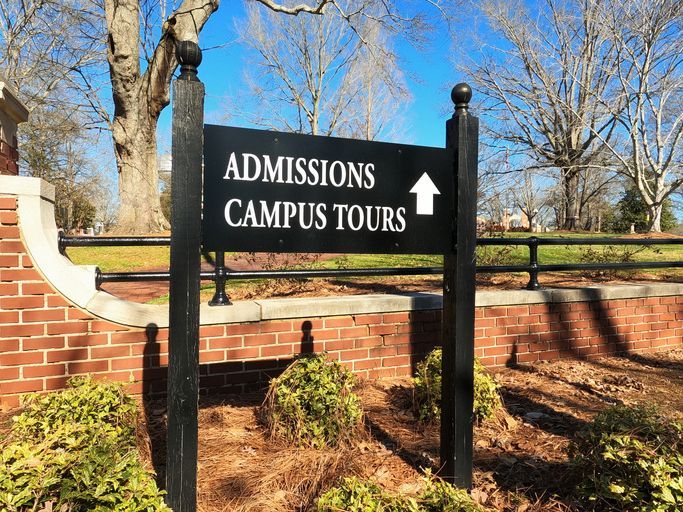This page is licensed under Creative Commons under Attribution 4.0 International. Anyone can share content from this page, with attribution and link to College MatchPoint requested.
How to Help Your Neurodiverse Student Get the Most from College Visits
We encourage all our families to visit at least 1 college (preferably more) during their decision-making journey. But for neurodiverse students, we recommend visiting at least 3 schools.

College can feel like an abstract concept for many neurodiverse students. And while guidebooks can be useful, they still only give a two-dimensional feel. Your student will likely have lots of questions. What is a "seminar"? What does "liberal-leaning" mean? What does "laid-back" look like on a college campus? What does a "small university with advantages of a larger school" imply? These are all aspects of a college that you can only understand fully by spending a day on campus and talking with students and campus professionals. Make sure to take notes and photos for your student during the visit, so they can focus on soaking up the school's culture.
Visiting colleges of varying sizes will help your student decide what feels best. Do they want small classes where they're graded on participation or large lecture classes where they don't have to speak up? Seeing these classes in action will help them see how these different formats feel to them.
Talking to students after a college visit provides us with a wealth of information to use when helping them create their college list. And, in the end, it will help them feel more confident about their choices.
To help your student get the best feel for any college, add these destinations to your campus tour. You can even try to make an appointment ahead of time, in some cases.
- A class: Sitting in on a class can lead to valuable information about the school's teaching philosophy and student engagement. If your student can attend one that's in their interest area, even better.
- The disability services (or accessibility services) office: Since your student will likely be using accommodations or support services in college, you should definitely visit this office to make sure it's a place where they'd feel comfortable. Is it in an accessible location that seems friendly and inviting? How many staff members are there, and what are their professional backgrounds? Do they offer all the services your teen will need to be successful academically? If possible, schedule a meeting with the head of disability services to discuss your teen's needs and ensure the college can effectively meet those needs with the accommodations offered to students with similar disabilities.
- A dining hall: Encourage your student to eat a meal at the dining hall to try out the food options and potentially talk to students in line or at a table. Observing what students do while they eat is informative. Do small groups sit together and talk? Do sports teams eat together? Is it mostly students eating alone while working on their laptops or phones?
- The counseling office: Most colleges offer free counseling services that any student can make use of during the school year. Drop by and see what the office is like, how many counselors there are, and what their professional background is. You may want to ask how closely they work with the disability services team.
- The career center: See if it looks robust and professional. Ask about what unique programs they offer, and pick up any brochures or materials so you can refer to them later. While you're there, ask if they have career services specifically for LD/ND students.
- The coach's office: If your student is an athlete considering playing their sport at that college, reach out to the coach (you'll want to make an appointment ahead of time).
- The international programs office: If your student is thinking about going abroad during college, ask about any programs or countries you know they're interested in visiting. You'll especially want to check in about any programs that LD students have successfully completed.
- A professor's office: Setting up a meeting with a professor in a subject your student is particularly interested in is a great way to get a sense of the academic culture of the school. Tip: have them type out a few questions on their phone ahead of time in case they get tongue-tied or nervous.
- The bookstore: Browse through the books for classes, gauge the friendliness of the staff, and make a purchase to remember the visit by.
- The surrounding community: Spend some time walking around the town or city where the school is located — maybe even eat in a local restaurant. Have your student imagine living there for 4 years. Is it a place where they'd feel comfortable and find enough to do?
By making all the stops that apply to your student, you'll give them a much more concrete and complete picture of a college. And if they decide to apply, they'll be able to provide great details as they rock the supplemental essays that ask, "Why X college?"

"College MatchPoint helps steer and advise you from beginning to end of the college search and application process. They take what can be a very stressful time and break it down into smaller, manageable pieces. Bob, Lisa and their staff support their student clients, enabling them to find the best fit. You can trust that the process will work; it did for all 3 of my very different kids."
— Ellen Miura
Subscribe
Sign up with your email address to receive news and updates.
Email signup
We will get back to you as soon as possible.
Please try again later.
ALL RIGHTS RESERVED | COLLEGE MATCHPOINT | SITE BY FIX8

